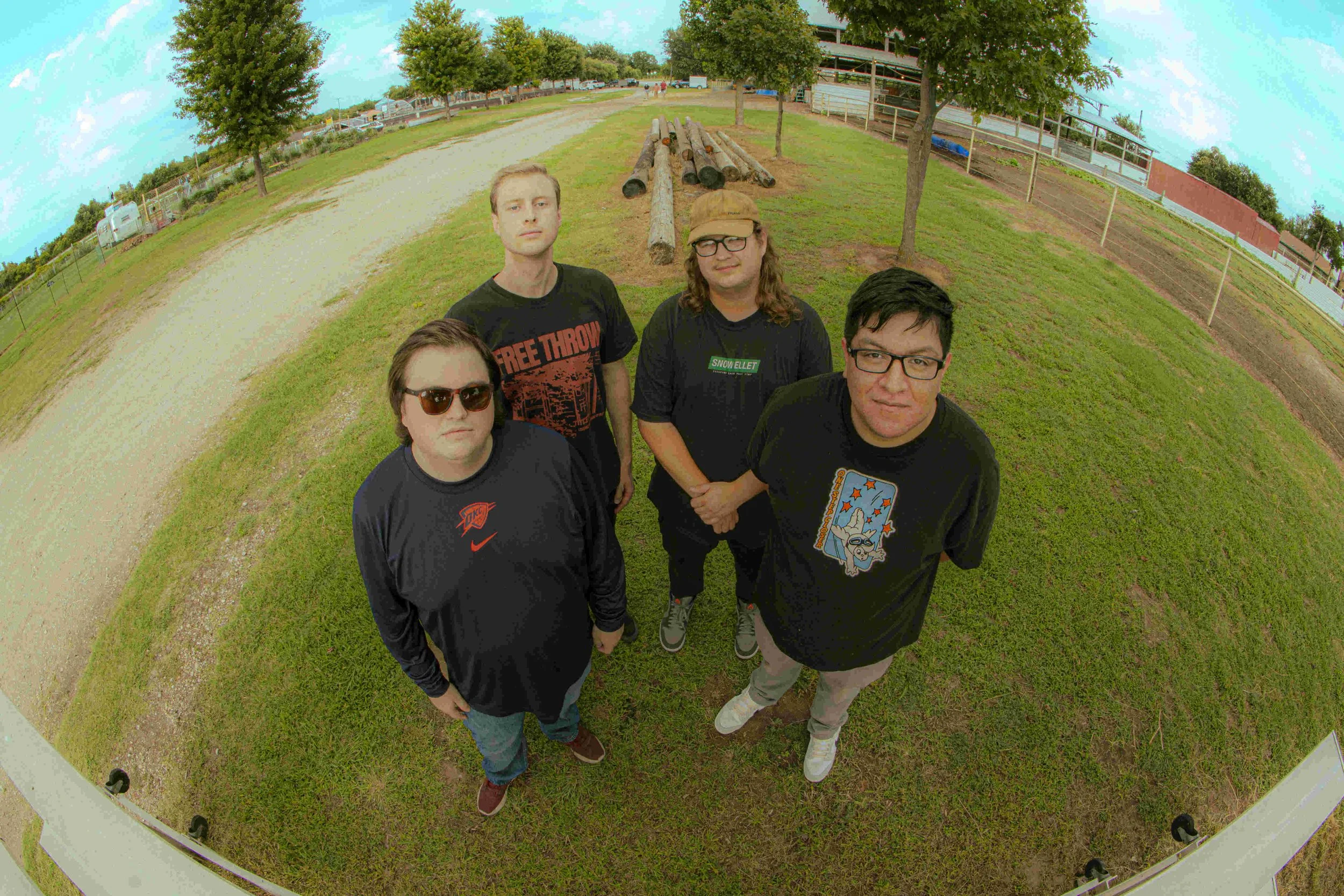End of an era for Beth Shalom Records: Joe Booley and Estie Joy on the label’s legacy and what lies ahead
On 9 November, Beth Shalom Records bid farewell as a label with a celebration at Fest Shalom 2024. The festival was a fitting tribute to the legacy the label built over ten years. A few days before the event, we caught up with Joe Booley and Estie Joy, the duo at the heart of Beth Shalom Records.
Over its ten years, Beth Shalom became known not just for its diverse roster or commitment to sustainability but for fostering a close-knit creative community that felt more like family than a label. As Joe and Estie shift their focus to live music promotion and other ventures, they look back on the label with honesty, gratitude, and warmth—sharing reflections on its legacy and a glimpse of what’s next for them and Beth Shalom.
With the label’s farewell at Fest Shalom just around the corner, Joe and Estie spoke candidly about the emotions behind this final event. Sharing her thoughts on the event, Estie laughed, “Honestly, we’re just trying not to cry all day. It’s going to be a big family party, not a massive rager. Definitely expect Joe and me to cry all day.”
Joe echoed the sentiment, detailing the care and thought that went into the event’s preparation. “We’ve curated the lineup carefully. It’s full of people who’ve been a part of the Beth Shalom family, whether we worked with them on releases, booked their gigs, or they’re just old friends of the label. And there’s going to be cheap vinyl and exclusive sustainable merch—it’s like a send-off with all the people who made it what it was.”
If you’ve ever spent time with Joe and Estie, or anyone connected to Beth Shalom, you’ll know that warmth and a genuine sense of home are at the heart of everything they do. For them, Beth Shalom has always been about fostering a sense of belonging—a reflection of their faith, which shaped the label’s soul.
“We’re both Christians, and that’s a huge part of who we are,” Estie shares. “The idea of welcoming everyone, of being inclusive, and creating a safe space comes directly from what we see in Jesus’ life. He loved people—especially those who didn’t feel they belonged anywhere else. That’s what we wanted Beth Shalom to feel like: a place where everyone’s valued.”
Joe adds, “At shows, we’d always make an effort to talk to anyone who seemed like they were having a tough time. Whether it was someone struggling with anxiety or just feeling out of place, we wanted them to know they mattered. It’s not just about music; it’s about people.”
This sense of community and purpose has been woven into Beth Shalom’s story since the very beginning. “The name came from my parents’ house, which was called Beth Shalom—‘house of peace’ in Hebrew,” Joe explains. “I always loved the idea of studios having in-house labels, so when I recorded in my bedroom or front room, it became Beth Shalom Studios.”
The label began as a way for Joe to give his solo music a more professional edge, but it quickly became a platform for others. “I started it to make myself look more professional as a solo artist,” Joe recalls. “I’d been gigging around the south of the UK for a couple of years and wanted to step things up. One of my lecturers, who’d worked with major labels and created his own, told me, ‘You’re already doing it—you’re already a label.’ At the time, I was burning CDs, typing out tracklists, booking my own gigs, and getting press. I realised he was right—I was already doing everything a label does. At college, I was also producing bands, and the label became a home for them as well.”
The label’s output has always been a reflection of Joe’s eclectic taste. “From folky indie to hardcore punk, it just made sense to showcase that diversity,” he explains.
A few years later, Estie joined the label, bringing fresh energy and her own creative perspective. With her background as a live music photographer and an eye for detail, she helped solidify Beth Shalom’s unique identity.
“Joe has always been a curator,” Estie says. “Every band we worked with was connected in some way. Whether it was through shared values, shared experiences, or just the fact that their music spoke to us, there was always a thread that tied it all together.”
This commitment to inclusivity and connection became a hallmark of the label. Over the span of a decade, Beth Shalom released more than 160 records, each one reflecting the care, intention, and personal touch that defined its ethos. Spanning genres as diverse as their own tastes, the label became known for treating every project with the same attention and respect—no matter the style or scope.
Some releases, like I Exist by americansignlanguage., stand out for their emotional resonance. “Adam [Hyman] explores his experiences with mental health so eloquently,” Joe said. “Watching him perform those songs live is cathartic. It’s not just about the music—it’s about creating space for conversations around men’s mental health.”
Estie added: “Adam is such an expressive performer, and you can feel the healing happening in the room when he plays. For me, someone who has struggled with mental illness, it’s always been powerful to see and hear that—it makes you feel less alone.”
Other releases, like Regal Cheer’s Cans, brought a completely different energy. “It was such a quick, ADHD-fuelled album, and it resonated with me so much,” Estie said. “That kind of punchiness is exactly what I love.”
Joe also pointed to Maker by Petlib. as a personal milestone. “We went all out for that record—everything from guerilla marketing with Morse code to creating this whole concept around it,” he shared. “It was the first time I managed a band through the label, and even though it didn’t reach the success we hoped for, it was such a fun and rewarding experience.”
For Joe and Estie, the label wasn’t just about releasing music—it was about fostering a sense of belonging. “The artists we worked with became family,” Estie said. “We shared meals, toured together, and celebrated each other’s wins. That’s what made Beth Shalom special.”
But running a DIY label wasn’t without its challenges. As Beth Shalom grew, so did the demands on Joe and Estie’s time. Both worked full-time jobsr—on top of managing the label’s increasingly complex operations.
“In the early days, it was amazing because we had time,” Joe said. “But in recent years, it’s been a lot of admin—packaging orders, chasing deadlines, managing releases. The things that were taking up all our time weren’t bringing us joy anymore.”
Estie elaborated: “We were pouring ourselves out constantly. Between our day jobs and running the label, burnout was creeping in. We were spread too thin, and it became clear we needed to refocus. We’d love to have a family one day, and we realised that our current pace wasn’t sustainable. Joe and I were giving so much to the label, but we needed to leave room for other things—like spending time together and being able to dream about what comes next. It’s hard to say goodbye, but it’s also the right time to shift focus.”
The decision to close Beth Shalom wasn’t easy, but Joe and Estie knew it was the right move. They pointed to broader shifts in the music industry, which have made running a DIY label increasingly difficult.
“The DIY label scene isn’t what it used to be,” Joe said. “Social media is saturated, and the way people consume music has shifted. Growing a band through live shows feels more natural now than through releases. We realised we could have more of an impact by focusing on live music and other creative projects.”
Despite the challenges, Beth Shalom remained steadfast in its values, particularly its dedication to sustainability. In 2020, the label became the first carbon-neutral record label in the UK—a milestone Joe and Estie take immense pride in. “We wanted our practices to reflect our values,” Estie explained. Joe elaborated: “From cutting down plastic in packaging to sourcing eco-friendly vinyl, every decision was intentional. Even our suppliers were chosen carefully—some repurposed off-cut vinyl waste into shoe soles, ensuring nothing went to landfill.”
Estie’s passion for sustainability drove many of the label’s changes. She explained her role in educating Joe about more nuanced sustainability practices, saying, “Most merch is fast fashion, sadly. When I joined Beth Shalom, I realised Joe genuinely believed the big merch companies were sustainable because of their marketing. I spent months researching third-party reports and digging into certifications. It was eye-opening for both of us.”
Joe added, “Estie completely changed how I thought about sustainability. She pushed us to think beyond what suppliers claimed and look deeper—at labour practices, environmental impact, and long-term effects. It wasn’t just about looking eco-friendly; it was about doing things properly.”
The label also partnered with a macadamia tree farming initiative in Malawi to offset its carbon footprint. Joe shared, “This wasn’t just about planting trees. It was about creating an ecosystem that benefited farmers by providing crops and additional income. The sustainability efforts weren’t just about us—they extended to everyone involved.”
Beth Shalom’s ethos inspired artists, even those who moved on from the label. “Seeing bands continue with sustainable merch practices after working with us was so rewarding,” Joe said. “It’s proof that the impact we made will outlast the label itself.
The culmination of ten years of passion and values came together at Fest Shalom 2024. Held at Hackney’s intimate and vibrant Oslo, the festival was a fitting wake for everything Beth Shalom Records has represented over its run. From exclusive sustainable merch to a record table brimming with hidden gems, the gathering brought together old friends, artists, and fans for one last, unforgettable hurrah.
“We’re bringing out all the stops,” Estie said before the event. “Old friends, familiar faces, and plenty of surprises. It’s not just about saying goodbye—it’s about celebrating everything we’ve built.”
Joe, performing for the first time in five years, reflected on the label’s legacy: “Beth Shalom has always been about community. Whether it’s supporting artists, promoting inclusivity, or just being a safe space, that’s what we’re most proud of.”
We sent our team member Schuyler along, and it was clear that Beth Shalom’s heart and warmth were on full display. From the raw emotion of Joe’s solo set to the electrifying performances by artists like Buds. and Pollyanna, the day perfectly captured everything Beth Shalom stood for.
Looking ahead, Joe and Estie are excited to focus on live music promotion and other creative ventures. “We’re not stepping away,” Joe clarified. “We’re just shifting focus. We’ve already got shows lined up for 2025, and we’re excited to grow as promoters and creatives.”
Estie added: “We’d love to expand Fest Shalom into a multi-venue event one day. For now, we’re taking things one step at a time, focusing on the things that bring us joy.”
Throughout our conversation, it became clear that Beth Shalom Records was never just a label—it was a home. For Joe and Estie, the past decade has been as much about building meaningful connections as it has been about releasing music.
“The art we’ve been part of will outlive us,” Estie reflected. “That’s the most fulfilling thing. Knowing that we’ve created something meaningful, something that helps people—that’s what this has always been about.”
While this chapter has come to an end, Beth Shalom’s legacy lives on—from the artists it championed to the conversations it sparked. Joe and Estie have left an indelible mark on the alt-scene, and as they step into their next chapter, it’s clear their story is far from over.
Delve into Beth Shalom’s legacy by exploring the label’s back catalogue.







































